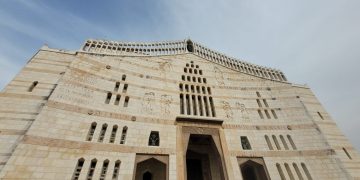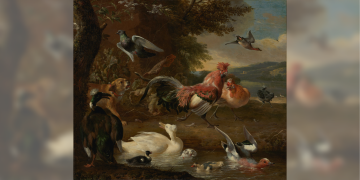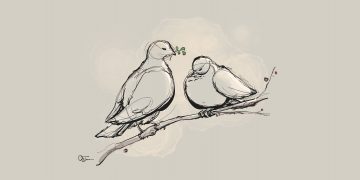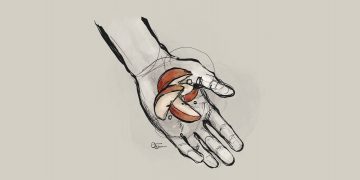As a person who loves to create, the art and stories I made before and after knowing Christ were quite different. During the transformation, I had a lot of questions about creativity.
Before I knew Christ, I was obsessed with horoscopes. Not in the way of fortune telling, but rather the personalities and the natural elements that are associated with them. I found their symbols and their origins from Greek mythology fascinating, and so I have written novels based on their characters. It was a time when I had the most inspiration, and the creative process was so smooth and effortless for me. I also began painting my imaginations, the environments and the character’s faces. I enjoyed creating them very much, and it was a space that gave me positive energy.
Then I came to Christ. When I was a new Christian, I felt a strong urge to stop writing horoscope-themed stories. My family, who have read my novels, were quite upset about my decision; but I was determined, no matter how much I loved it. I was young and hot-blooded, which made me very willing to sacrifice my talents for the love of Christ.
Since then, I seemed to have lost the ‘power’ to do any new “world building” and story writing. Whenever I have a new theme in my head, I cannot continue developing it. My mind was blank for a while.
Perhaps I was cautious because of what I created in the past. I offended God when I dwelled in the world of horoscopes, writing the twelve constellations as gods in my book. He must be upset seeing me stay up all night researching everything about the stars, moons and planets. I did not want that to happen again.
However, I felt that something was not right.
I knew very well that my spiritual gift is craftsmanship, and I have a strong calling to be an artist and story-teller.
If I cannot be free with my imagination, how am I supposed to explore new ideas and produce interesting content?
The following are the three most common questions Christian artists or story-writers ask, including myself back then. Today, as a professional artist, I do have something to share!
1. Does thinking up non-existent worlds, characters and creatures offend God’s creation?
A pastor (Ps. Sherman) once said to me:
‘If you think you can think up stuff God hasn’t thought of, then your God is too small.’
No matter how creative a person is, no one can change or redesign the universal laws. Those laws were set by God, but God still gave us the freedom to create, because He wanted us to explore His wonders.
“It is the glory of God to conceal a matter; to search out a matter is the glory of kings.” (Proverbs 25.2 NIV)
We have to know that creativity is a gift from God. The God who breathed life into us is a creative God. The first sentence in the Bible began with ‘In the beginning God created…’ (Genesis 1.1), and He let Adam name all of His creations (Genesis 2.19-20). God wants us to participate in His creation, and using our creativity is a part of glorifying Him.
If we look back in history at all the art pieces and designs humans made, nothing is completely original. What made the art unique is always the story behind the creation. Therefore, creativity is not really creating new ideas, but borrowing ideas to improve, change, and add to it from the perspective of the maker. It is a beautiful process, and that is how art can inspire and connect people.
2. Am I limited to making Christian-related art and stories for the rest of my life?
Short answer is… No!
Some renowned and well-respected Christians wrote fiction about other gods and spiritual beings that are not necessarily from the bible. Narnia by C.S. Lewis, and The Silmarillion by J.R.R. Tolkien are some famous examples. Both writers wrote the creation of the world in these stories. In The Silmarillion, Tolkien’s use of gods was greatly inspired by Greek mythology.
In the book Called to Create by Jordan Raynor, he took Lewis as an example of how parables can be a powerful tool to reveal spiritual truths. He attached a letter from Lewis to his fans in 1961:
“The whole Narnian story is about Christ. That is to say, I asked myself “Supposing that there really was a world like Narnia and supposing it had (like our world) gone wrong and supposing Christ wanted to go into that world and save it (as he did ours), what might have happened?” The stories are my answers.”
Raynor continued to elaborate:
“We don’t have to prove to people that we are Christians through their senses. We want to appeal to people’s hearts.”
In the Garden City by John Mark Comer, he says that when we admire a piece of artwork or music, we know a bit of what the artist is like. When we admire the creation of the world, we catch a glimpse of what God is like. The stars speak the glory of God by being a star, the trees by being trees, and we humans by being human.
A lot of times, we try to label ourselves as Christian by making sure people know that we are Christians – we go to church, listen to worship music and decorate our desks with verses and crosses, which are all great! However, there are so many more ways to spread the gospel, and with our gift of creativity, we can use our unique stories and gifts to influence one another the way God made us to be.
3. What can I create as a Christian?
Instead of figuring out what we should or should not create, we should seek the motive and intention behind our creation. Why would I pick this particular theme for this art piece, or what is the reason or message behind a story I am trying to tell?
When we let the Holy Spirit into our hearts, whatever flows out of our mind, body and soul will naturally glorify our God. Let our hearts be transformed by the gospel. Our acts reflect our inner heart. If our heart is fully transformed into the heart of flesh through Christ, our intentions and motives will be renewed.
Now when I look back at my horoscope novels, I begin to have new thoughts. It may not be a great idea to portray the horoscopes as gods in my book, but the themes of love, friendship and loyalty I wrote in the story were some of the qualities God values. All I had to do was eliminate the horoscope gods and replace them with something else!
I can freely write and paint whatever moves and inspires me, as long as I keep my intentions in check, and devote myself to God daily.
The more I learn about His characteristics, the more I know what He loves and what He hates.
“Finally, brothers and sisters, whatever is true, whatever is noble, whatever is right, whatever is pure, whatever is lovely, whatever is admirable – if anything is excellent or praiseworthy – think about such things.” (Philippians 4.8 NIV).
“And do not be conformed to this world, but be transformed by the renewing of your mind, so that you may prove what the will of God is, that which is good and acceptable and perfect” (Romans 12.1-2 NASB).
Start creating with a transformed heart!































































